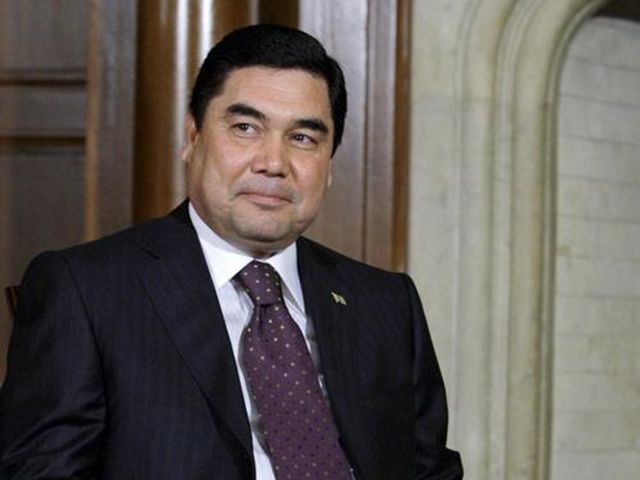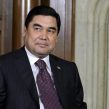
Berdimuhamedov’s Campaign for Political Pluralism and the Daikhan Party: Farmers of Turkmenistan Unite
Publication: Eurasia Daily Monitor Volume: 7 Issue: 111
By:

Since Turkmenistan’s independence in 1991, the Democratic Party of Turkmenistan (Turkmenistanyn Demokratik Partiyasy) and its corresponding Revival (Galkynysh) political movement have been the country’s only officially-registered political entities. Now, after three years in power, it appears that President, Gurbanguly Berdimuhamedov, may at last be interested in political pluralism. During a meeting of cabinet ministers on February 18, Berdimuhamedov first announced that a new political party could be registered sometime this year. Berdimuhamedov stated that the new party would compete with the Democratic Party of Turkmenistan, thus demonstrating that Turkmenistan is progressing on “the path to democracy” (www.gundogar.org, February 19).
Despite Berdimuhamedov’s statement, many international observers were doubtful that the government would create a new political party at the implied risk of encouraging political dissent. In 1992 and 2003, laws were passed on the registration of social organizations, including political parties, but the government under former President, Saparmurat Niyazov, never acted on either of those laws. Perhaps what is different this time is that the president is persistently advancing the idea of a second official party. On May 14, at a meeting of the Council of Elders (Yashularynyn Maslakhaty) in Dashoguz, Berdimuhamedov again stated that Turkmenistan is “ready for a multi-party system” and suggested that the new party would be the agrarian-based Farmers’ (Daikhan) Party (www.turkmenistan.ru, May 15).
Berdimuhamedov’s plan to create a new party is noteworthy because the country lacks a diverse political tradition, and the government has consistently oppressed opposition of any sort. Leaders of early political movements, such as the Agzybirlik People’s Movement and Paikhas, were persecuted and/or imprisoned for advocating democratic reforms. Current opposition movements abroad, including the National Democratic Movement of Turkmenistan, the Republican Party of Turkmenistan, and the Fatherland [Watan] Party, are small and not permitted to operate within the country. While Turkmenistan held its first multi-candidate presidential election in February 2007, only candidates from the Democratic Party of Turkmenistan were allowed to register. Aside from Berdimuhamedov, who was First Minister of Health and then Deputy Prime Minister prior to becoming interim president, all the other candidates were relatively unknown and non-threatening challengers. True opposition candidates were essentially banned from the contest due to the stipulation that they had to have lived in Turkmenistan for the previous 15 years in order to be eligible. The other former presidential candidates have had little political coverage since 2007, with the exception of Ashyrniyaz Pomanov, reprimanded by Berdimuhamedov in March 2009 “for serious shortcomings in the work on the development and improvement of the city of Turkmenbashi” (www.turkmenistan.ru, March 21, 2009). Consequently, it is unlikely that any of these individuals will emerge as serious contenders for the leadership of the new party unless it is created with the intent of subservience to the Democratic Party of Turkmenistan. One of the potential consequences of creating a second party is that it would imitate opposition parties in other Central Asian states and become another voice for the presidential administration instead of representing the true opposition.
Despite Berdimuhamedov’s various statements, questions remain regarding his overall objective in creating a new party. A second official party could provide a sense of popular legitimacy for citizens and the international community. Foreign assistance from Western countries is often tied to democratization efforts, a two-party system would be viewed as more democratic and thus encourage other countries to provide assistance to Turkmenistan and strengthen bilateral relations. European approval could indeed be on Berdimuhamedov’s mind, in light of a March 2010 report by the European Bank for Reconstruction and Development in which the organization stated that it is “concerned with Turkmenistan’s failure to make progress towards multi-party democracy, pluralism and a market-based economy” (www.ebrd.org, March 23). If the new party emphasizes an agrarian agenda, then it could gauge societal attitudes and concerns regarding Turkmenistan’s agricultural sector. Berdimuhamedov could also use the new party to “test” public reaction to potential policy changes if it becomes another body to advance the president’s agenda.
Finally, there is the question of who will lead the new political party if, in fact, it is created. Farid Tukhbatullin, exiled civil society activist and head of the Turkmen Initiative for Human Rights, has stated that he believes that Aleksandr Dadaev, a poultry farmer, Chairman of the Union of Industrialists and Entrepreneurs, and Berdimuhamedov’s personal friend, will be the party leader or a key representative (www.chrono-tm.org, May 18). Current members of the Berdimuhamedov administration contemplating joining the leadership of the new party would be wise to remember the fates of former foreign ministers, Avdi Kuliev and Boris Shikhmuradov. Both men were high-level Niyazov loyalists until they defected to the opposition –a move which eventually forced both into exile, until Kuliev’s death in 2007, and Shikhmuradov’s imprisonment in 2002. Based on Berdimuhamedov’s response to an inquiry about Shikhmuradov’s whereabouts in 2007, it is assumed that he is still serving a life sentence in prison, if not deceased (www.ferghana.ru, September 26, 2007). Taking into account both the potential risks and benefits that come with creating a second political party, it remains to be seen who will be bold enough to accept responsibility for Berdimuhamedov’s initiative.




